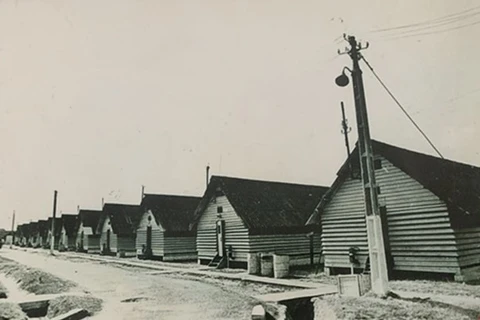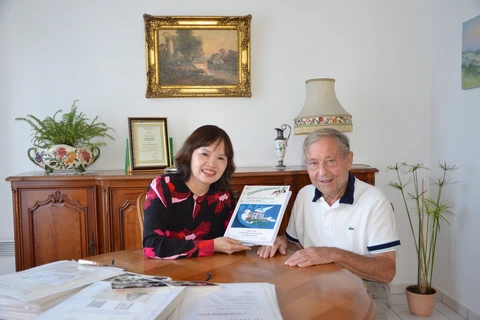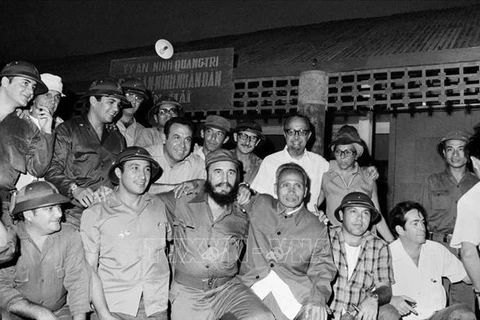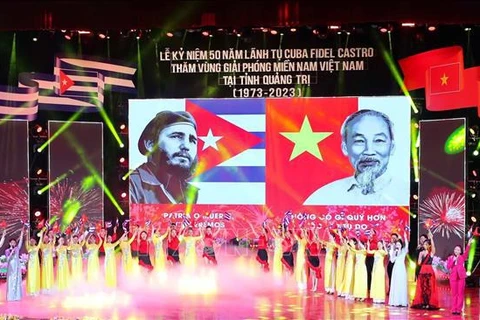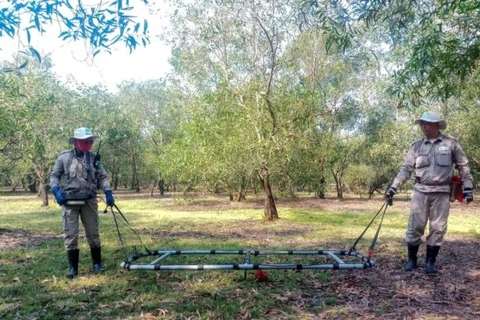 Nguyen Thi Binh, Foreign Minister of the Provisional Revolutionary Government of the Republic of South Vietnam, signs the Paris Peace Accords at the international convention centre in Paris, France, on January 27, 1973. (Photo: VNA)
Nguyen Thi Binh, Foreign Minister of the Provisional Revolutionary Government of the Republic of South Vietnam, signs the Paris Peace Accords at the international convention centre in Paris, France, on January 27, 1973. (Photo: VNA) The Tri - Thien Campaign to liberate Quang Tri in 1972 and the struggle that lasted for 81 days and nights, from June 28 to September 16, 1972, to defend Quang Tri Ancient Citadel are among the many fights and places going down in the great national safeguarding history.
After being defeated in the 1972 Tri - Thien Campaign, the US and its puppet administration plotted to re-occupy Quang Tri Ancient Citadel to gain an advantage in the negotiations at the Paris conference. Meanwhile, the Vietnamese army and people stayed resolute to defend this citadel to add to victories on other battlefields to force the US imperialists to sign the Paris Agreement on Ending the War and Restoring Peace in Vietnam.
Together with the fierce fight to protect Quang Tri Ancient Citadel in 1972, the Vietnamese army and people’s defeat of the US’s unprecedented strategic bombings in December the same year to create the “Hanoi – Dien Bien Phu in the air” victory forced the US to sign the Paris Peace Accords on January 27, 1973.
Prof. Dr. Trinh Quang Phu, Director of the Oriental Research Development Institute under the Vietnam Union of Science and Technology Associations, said the Paris Peace Accords came as a result of the Vietnamese army and people’s struggles on battlefields and the military - diplomacy excellent combination. The successful safeguarding of Quang Tri Ancient Citadel during the 81 days and nights helped force the enemy to sit down at the negotiating table to ink the Paris Agreement on Ending the War and Restoring Peace in Vietnam.
More than half a century has passed, the former battlefield of Quang Tri is now covered with rice paddy fields, industrial tree plantations, and forests. Residential areas, big roads, and modern sea and air ports have been being built in the areas once witnessing ferocious fights over 50 years ago. Local residents have also enjoyed better life quality with per capita income averaging 71 million VND (nearly 2,900 USD) in 2023.
Nowadays, tourists come to Quang Tri to learn about, feel, and understand the pains of war and division nothing can compensate for that the nation suffered in the past. Here, they can thoroughly grasp the passion for living, independence, freedom, and reunification of a nation that used to grapple with challenges and wars waged by the most powerful invaders throughout history to become fully aware of the values of peace and development.
Nguyen Huy Hung, Deputy Director of the provincial Department of Culture, Sports and Tourism, said Quang Tri is home to 501 historical and cultural relic sites, many of which are renowned among domestic and international visitors thanks to their historical significance. Such special national relic sites as Quang Tri Ancient Citadel, Hien Luong Bridge and the Ben Hai River, Vinh Moc Tunnels, the tunnel village of Vinh Linh, the Truong Son national martyrs’ cemetery, and the Road 9 national martyrs’ cemetery have made up the uniqueness and attractiveness of the system of local war relic sites.
Quang Tri could be considered the most vivid museum of revolutionary war relics, he said, noting that this is a basis for developing cultural and historical tourism.
The provincial administration is set to organise the first Festival for Peace in July 2024 to honour the values of peace and call on all people to join hands in maintaining and building a life of peace, prosperity, and sustainability for Quang Tri, Vietnam, and humankind.
It will pay tribute to the heroes and soldiers laying down their lives for the immortality of the Fatherland while commemorating war victims as well as war losses and pains. It will also introduce tangible and intangible cultural values along with tourism products of Quang Tri to help attract domestic and international visitors, thus contributing to local socio-economic development./.
VNA
